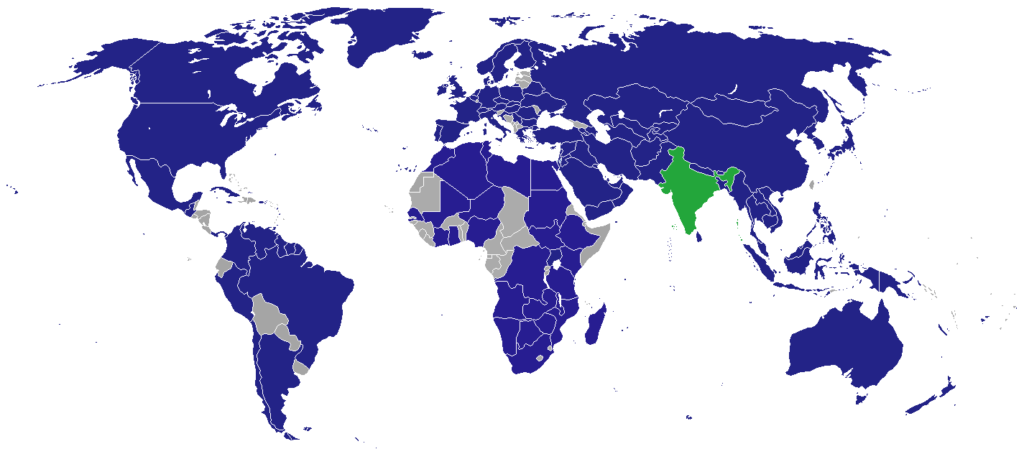The Sad State Of Foreign Policy Education In India.
If a country expects to have a strong foreign policy, a very crucial element to that remains the will of the people and their involvement in the foreign policy machinery. This becomes all the more important in democracies where the will of the people are the basis of the decisions made by the ruling class. Without this, no country can make solid decisions in not only foreign affairs, but any other subject of national importance.
In India, the subject of foreign policy is not one that is adequately discussed and deliberated in the public arena. As a result, most of the decisions of foreign policy issues concerning India is done by very few people with little to either apply pressure or change decisions drastically.
It is highly unlikely that ministers would resign or really strict action be taken against officials over foreign policy matters even if mistakes of epic proportions are committed and India’s foreign policy objectives and national interests are affected adversely. Foreign policy consequences don’t impact the government so much in terms of backlash if compared to domestic issues.
In comparison to countries like the USA or others, India’s engagement in foreign policy remains low and ambiguous. The post of the Secretary of State in a country like the USA is one of the most coveted. Foreign policy issues sometimes even turn into electoral issues.
The USA is not an exception from the rule. The example of Ukraine is still fresh in the news cycle where people tried to overthrow a government when they didn’t honor the wishes of the people to be more closer to the EU than with the Russian Federation.
For a country that constantly aims to be more connected with the rest of the world, India’s engagement in terms of its own foreign policies seem to be so minimal. But this can be attributed to the fact that people are not interested in delving into foreign policy issues.
One of the contributing factors is perhaps the very sad state of foreign policy education in India.
This system has contributed to not only disinterest towards the subjects by students but also is often factually incorrect and gives a lack of perspectives, to name few of the problems associated with foreign policy education in India.
To begin with, the syllabus is always outdated and has lost touch with the contemporary world. The syllabus is also reduced to numbers and useless statistics which don’t have a point. Given that foreign policy is a subject of contemporary importance and is very dynamic, a syllabus like this cannot be taken seriously.
Of course, the Indian education system by itself has a huge role to play in this with its emphasis on the use of rote learning and the lack of fresh perspective and the stifling of student creativity. Foreign policy taught to kids since Grade 5 remains almost the same even at college level. There is no fresh learning. Foreign policy has meant that students will be attuned to a single mindset without change throughout their lives.
The current system has taught the average Indian the following about foreign policy:
1) Foreign policy is static and is not subject to change or updating
2) Foreign policy follows a single track and a single narrative
3) Foreign policy is a job of the government and has no bearing on the life of the common man.
4) Countries are either your friends or your enemies. There are no grey areas in relations.
When the same syllabus is taught to students over years, this becomes the norm and students identify that as a never-shifting policy. Foreign policy education has become nothing more than nearly one-sided propaganda spewed by the government in order to manufacture some form of support and legitimacy from the people. What better way than to mold gullible minds into thinking that Indian foreign policy has been the pinnacle of Indian success.
A very beautiful example of India’s propaganda would be how Indian foreign policy education rarely talks about India’s failures in the 1962 war against China. In some textbooks, there is no mention of the war, let alone the reasons for India’s failure.
And the worst of all, by reducing the subject to facts and statistics, they have removed any sort of link between foreign policy and the lives of the common people. How is an average person supposed to deduce that foreign policy has a major bearing in his/her life from statistics of Indo-Korean trade or Indo-US nuclear cooperation?
So with the lack of relevance, the average Indian becomes disinterested and by creating an over-glorified and exaggerated picture of India’s triumphs in Indian foreign policy, the average Indian is led to believe that the policy makers will not mess up foreign policy.
Foreign policy education in India is basically a history lesson without almost no current relevance whatsoever. Students are taught the foreign policy of India from Independence to the present. Indian foreign policy education makes a few points and repeats it to kingdom come. These points include:
1) Non-Alignment
2) The Panchsheel Principles
3) Look East policy
On one hand, it is perfectly alright to know these concepts and to understand what it meant, but on the other hand, it is unacceptable to keep harping about them throughout school and throughout college and hold these principles to be ever-lasting and never-changing. The saddest part is that even these policies are not explained in the current context and are given absolutely no fresh perspectives.
In which case, students would still view principles such as Non-Alignment and Panchsheel as the only truth in Indian foreign policy and they would never try to really question it. This is why India rarely has debates on subjects like the relevance of NAM, or the re-thinking of foreign policy. The question of debates don’t come up when nobody is even interested, and these are factors that have contributed to the lack of interest.
If India were to reform the way in which it taught foreign policy to students, it would have to overhaul the entire thing. For one, it needs to rethink teaching what has become clichéd foreign policy topics such as non-alignment and the Panchsheel. If not eliminate it completely, at least they must review and update the way they teach it. The syllabus itself is a big problem. It evokes no interest in the mind of the student, it is mindlessly glorified and sometimes even factually incorrect and barely teaches anybody anything.
There is no way a person would be prepared to deliberate on foreign policy with a very limited and narrow minded syllabus like what we currently have.
Secondly, foreign policy education needs to focus itself on teaching how foreign policy is relevant to personal lives of people than giving an antiquated history of foreign policy and expecting people to get interested in it. Of course, this would ideally be something that needs to be changed in the way we are taught everything, not only foreign policy.
Without an adequate overhaul of the way we are taught foreign policy, there is no way that Indians will provide a more comprehensive opinion about Indian foreign policy. And without a larger share of Indian citizens paying attention to foreign policy, we can be assured that India’s projection to the outside world will be constrained and limited.
About The Author:-
Ashwath Komath is a graduate in Political Science from Fergusson College, Pune. He also holds diplomas in National Security, International Relations and Understanding United Nations. He is an avid reader and likes to write from time to time. He likes to write about topics such as international relations, foreign policy, security and terrorism. When he is not reading or writing, Ashwath enjoys playing pool with his friends, watching foreign cinema and listening to music, especially instrumental.




![Police Reforms – Priority ignored [Republished from Epilogue Press] Police Reforms – Priority ignored [Republished from Epilogue Press]](https://arguendo.co.in/wp-content/uploads/2017/07/41-150x150.jpg)

Leave a Reply